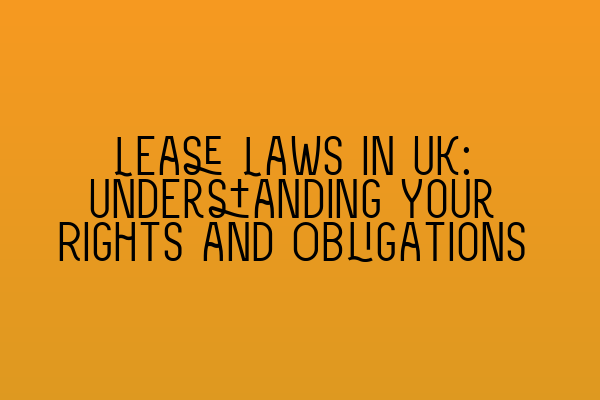Lease Laws in UK: Understanding Your Rights and Obligations
Welcome to SQE Property Law & Land Law, where we strive to provide expert insights and guidance on various legal matters. In this blog post, we will delve into lease laws in the UK and help you understand your rights and obligations as a tenant or landlord. Whether you are renting a residential or commercial property, it is essential to be aware of the legal framework that governs lease agreements. So, let’s dive in!
Key Points:
– What is a Lease?
– Types of Leases
– Rights and Obligations of Tenants
– Rights and Obligations of Landlords
– Termination of Lease
– Seeking Legal Advice
What is a Lease?
A lease is a legal document that outlines the terms and conditions of a rental agreement between a landlord and a tenant. It provides clarity on the rights and responsibilities of both parties, ensuring a harmonious landlord-tenant relationship. Leases can vary in duration, from short-term agreements to long-term leases lasting several years.
Types of Leases
There are different types of leases available, depending on the nature of the property and the intended use. Here are some common lease types you may come across:
– Assured Shorthold Tenancy (AST): This is the most common type of residential tenancy in the UK and offers tenants a minimum security of tenure. ASTs are typically granted for a fixed term, usually six or twelve months, and provide certain rights and protections to the tenant.
– Commercial Lease: For businesses looking to rent office space, a commercial lease is the most appropriate option. These leases are tailored to meet the needs of commercial tenants and often have longer terms and different provisions compared to residential leases.
– Ground Lease: Commonly used for long-term leases, ground leases allow tenants to lease only the ground on which a property is built. The tenant is then responsible for constructing or maintaining the improvements on the land.
Rights and Obligations of Tenants
As a tenant, you have specific rights and obligations under lease laws in the UK. It is crucial to understand these to protect your interests. Here are some key points to consider:
– Right to Quiet Enjoyment: As a tenant, you have the right to enjoy the property without interference from the landlord. This means that the landlord should not enter the property without your permission, except in certain circumstances.
– Payment of Rent: Tenants are obligated to pay the agreed-upon rent on time. Failure to do so may result in legal action, including eviction.
– Property Maintenance: Tenants are responsible for maintaining the property in good condition, subject to fair wear and tear. Any damages caused by the tenant may result in the forfeiture of their deposit or potential legal action.
– Compliance with Regulations: Tenants are expected to comply with all relevant laws and regulations, including health and safety requirements.
To learn more about your obligations as a tenant, check out our related article on Parties in a Contract: Rights and Responsibilities.
Rights and Obligations of Landlords
As a landlord, you also have certain rights and obligations that you need to be aware of. Here is an overview of what you should keep in mind:
– Right to Receive Rent: As a landlord, you have the right to receive rent from your tenants. It is essential to set clear payment terms and pursue legal action if necessary to recover unpaid rent.
– Property Maintenance: Landlords are responsible for keeping the property in a habitable condition and ensuring that all necessary repairs are carried out promptly.
– Access to the Property: While tenants have the right to quiet enjoyment, landlords also have the right to access the property for specific reasons, such as inspections or repairs. However, landlords must provide reasonable notice to the tenant.
– Deposit Protection: Landlords are required by law to protect their tenant’s deposit in a government-approved tenancy deposit scheme. Failing to do so can result in penalties and legal consequences.
To gain a better understanding of your rights and obligations as a landlord, read our related article on Understanding Contractual Capacity: Rights and Limitations.
Termination of Lease
Lease agreements come to an end for various reasons. Some lease terminations are planned, while others may be due to unforeseen circumstances or breaches of the agreement. It is crucial to understand the termination procedures outlined in the lease and applicable laws to ensure a smooth transition. Both tenants and landlords should be aware of their respective rights and obligations when terminating a lease.
Seeking Legal Advice
Lease laws in the UK can be complex, and it is advisable to seek legal advice to ensure compliance and protect your interests. At SQE Property Law & Land Law, our team of solicitors specializes in lease matters and can provide expert guidance based on your specific situation.
We also invite you to check out our website for more resources, such as our Interactive SQE Mock Tests for Contract Law and SQE Contract Law Webinars for expert insights and guidance.
Conclusion
Understanding lease laws in the UK is essential for tenants and landlords alike. By familiarizing yourself with your rights and obligations, you can ensure a smooth and mutually beneficial landlord-tenant relationship. Remember to seek legal advice when necessary and stay informed about any changes in lease laws to protect your interests.
